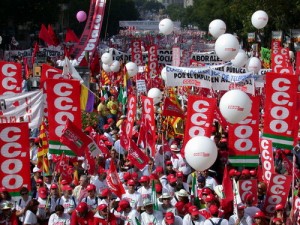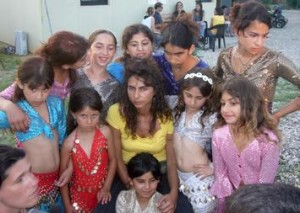The statisticians may argue for some time to come about the success or otherwise of Spain’s general strike. To nobody’s surprise, the UGT and CCOO unions, which organised the country’s first nationwide strike in eight years, described the protest as an overwhelming success, while the government said participation was “uneven”. Judging by Prime Minister José Luis Rodríguez Zapatero’s insouciant demeanour as he entered Congress on the morning of the strike, his government had little to worry about. And yet, the mass closure of businesses for the day, the crippling of the country’s bus services and thousands (or 70 percent, according to the organisers) of workers marching through Spain’s … [Read more...] about Spain’s general strike: too much, too late
Politics
Acquaintance rape: the trauma and shame of a hidden crime
“When I realised what he was going to do, I froze and the panic immobilized my body. I realised I couldn’t fight back. I am 48 kilos; he was 1.90 meters tall and very strong. I tried to scream but my voice wouldn’t come out, who could come rescue me? I suddenly saw myself floating above the room out of my body.” These are the words of Silvia (which is not her real name), who was raped by a man she had been dating for two months when she told him she wanted to break up. Besides the trauma of the experience itself, she then found herself in a quandary when it came to reporting the crime. “I thought about going to the police but would they believe me? He raped my in my own house, used a … [Read more...] about Acquaintance rape: the trauma and shame of a hidden crime
Sarkozy’s Gypsy policy a boon for Spain’s xenophobes
France has done Spain a couple of big favours over recent years. For one, it has kept up police pressure on Basque separatist group ETA, which has for decades used southwest France as a haven for its terrorists. Cooperation between Spanish and French authorities has led to dozens of arrests, leaving the organisation on its knees. Also, President Nicolas Sarkozy boosted his neighbour’s international profile by ensuring Spain had a seat at G20 summits, even though the country was not part of the G8. With that in mind, perhaps it is not so surprising that Socialist Prime Minister José Luis Rodríguez Zapatero backed Sarkozy during the recent controversy over France’s deportation of Romanian … [Read more...] about Sarkozy’s Gypsy policy a boon for Spain’s xenophobes
Basque ceasefire offers Zapatero illusion of a lifeline
The latest ETA ceasefire has the look of a Trojan horse. All previous truces have ended in a return to bloody violence by the Basque terrorist organisation. But in Prime Minister José Luis Rodríguez Zapatero’s mind, a little spark of optimism has surely been reignited at a time when he and his governing Socialist Party are in desperate need of a positive development. Yes, that very “optimism” which Zapatero expressed just hours before ETA ruptured its previous ceasefire, detonating a car bomb at Barajas airport and leaving two dead in late 2006. The prime minister has since spoken of his upbeat attitude towards the peace talks in Switzerland of that autumn as his biggest mistake. But … [Read more...] about Basque ceasefire offers Zapatero illusion of a lifeline
Optimism at ETA truce is tempered by bitter experience
ETA’s announcement that it has “stopped carrying out offensive armed attacks” is, on the face of it, heartening news; and yet the overall mood following the ceasefire declaration was one of caution, scepticism and even suspicion. It was widely anticipated that a truce announcement was imminent, due to the well-documented efforts of the izquierda abertzale, the political radicals closely associated with ETA, to pressure the organization into giving up its violent campaign. The declaration, the recording of which was given to the BBC, was classic ETA public relations: a masked woman, flanked by two masked colleagues, read it out in Euskera against the backdrop of the group’s emblem, the … [Read more...] about Optimism at ETA truce is tempered by bitter experience
Melilla spat with Morocco reveals uncomfortable truths
Blockades stopping fresh food from entering Melilla by a Moroccan group in mid-August were highly inconvenient for the inhabitants of this North African enclave belonging to Spain. However, the protest itself –against allegedly abusive and racist behaviour by Spanish police on the border between the city and Morocco– paled in comparison to the political repercussions of the episode and hinted at the complex and sensitive nature of the relationship between these two countries. The two short blockades, which stopped trucks carrying perishable foodstuffs from entering the city, each lasted little more than a day and the issue appears to have been closed following a meeting between Spanish … [Read more...] about Melilla spat with Morocco reveals uncomfortable truths
Silly season divides Spanish and English-speaking media
It’s August: the silly season. The month when newspapers and the media in general have little real news to cover, so they pay even more attention to B-list celebrity love triangles, local politicians’ sex-changes and garbage collectors’ concerns about being suspected of being paedophiles. That’s in Britain, at least (all those stories featured in The Sun on August 11). For the summer months illustrate better than any other the gulf dividing the Spanish media and its English-speaking counterparts. The summer holiday period is observed by Spain perhaps more assiduously than any other European country. Many bars, shops and other businesses shut down for most of August as ordinary … [Read more...] about Silly season divides Spanish and English-speaking media
Opposing Spain’s abortion law: don’t blame the Church
On July 5, Spain introduced legislation bringing the country’s abortion laws into line with those across northern Europe. In essence, the new law allows the procedure without restrictions up to 14 weeks and gives 16-year-olds the right to have abortions without parental consent. Until now abortion had been illegal unless the woman could prove that she was raped, that the foetus was malformed, or that the pregnancy endangered her physical or mental health. In practice, the latter reason was used across a network of private clinics, which perform around 100,000 abortions a year. The issue has been reported in the international media as a battle between the secular Socialist Party … [Read more...] about Opposing Spain’s abortion law: don’t blame the Church
Freed Cuban dissidents adjust to life in Spain
When the Cuban dissident Ricardo González was released from jail and put on a flight to Spain, what struck him first about his newfound freedom was the airline food. “The thing that impressed me on the flight to Madrid was the fact the food was hot,” González, 60, said. “I hadn’t eaten hot food for seven years and four months.” This is just one of the many changes González and a group of other freed Cuban prisoners have experienced since the government’s announcement July 7 that over the next few months it will release the 52 dissidents still behind bars following a 2003 clampdown that put 75 people in jail. The decision is the result of diplomatic efforts by the Spanish government … [Read more...] about Freed Cuban dissidents adjust to life in Spain
Spain’s drug problem
If the yardstick measuring a country’s drug problem is the widespread availability at low prices of banned chemical substances, then it would seem Spain has a drug problem. The EU’s European Drug Observatory says that around 120 tons of cocaine is intercepted each year by police in Europe, and that three quarters of those seizures take place in Spain and Portugal. Attempting to estimate how much the police miss is next to impossible. An often-cited figure that law enforcement agencies catch just 10 percent of the illegal trade is not based on empirical evidence - although extrapolations are frequently used to guess the extent of domestic drug supply by multiplying the volume of seizures … [Read more...] about Spain’s drug problem




